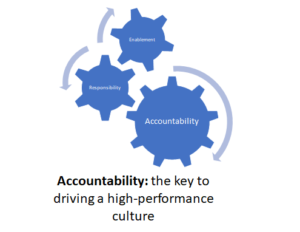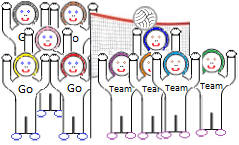Recently I have been thinking about how leadership and culture plays an essential role in our ability to deliver quality solutions. More importantly how accountability will have a direct impact on our ability to help team members stay engaged and empowered to produce positive results.
There are different accountability chains based on the alignment of project resources. Specifically, when you look at matrix project reporting structures vs functional project reporting structures you will have different layers of accountability. The type of project organization structure has a direct impact on the project leader’s ability to influence or drive accountability.
When you do not have a culture of accountability in your organization you will have some of these resultative behaviors:
- Morale issues – top performers tend to disengage.
- Siloed behavior – you will hear “well my resource manager told me to do this” specifically observed in a matrix organizational structure.
- Rescuer behavior – because the person believes they must make up for others not performing their respective roles on the project.
- Active disengagement – because the team do not feel empowered to hold each other accountable for results.
From my experience on leading projects in both matrix and functional project structures I have found that it is critical that the project and program leader focus on these key qualities to embed accountability in your solution delivery practices. This is not an all-inclusive list but rather some key focus areas to drive:
- Goal setting – set clear expectations up front and inform the team how they have influence in the team’s ability to be successful by clearly defining what success means.
- Empowerment – reinforce with your team that there will be mistakes, and if we as a team own our mistakes, learn from them we will move on and be better for it. This safe environment approach will help your team members embrace their empowerment.
- Process adherence – with clearly defined delivery processes established the team have a roadmap on how the overall solution will be delivered.
- Encourage continuous improvement – as a leader you need to encourage the team to bring their thoughts and ideas on how to enhance or change processes for better outcomes moving forward.
- Team accountability – the team need to understand the goals of the delivery and then hold each other accountable.
- Measuring success – the team need to understand how their performance will be measured and how their respective inputs align with the overall delivery success.
- Celebrate success – recognition and success are key motivating factors for your team. It cannot be underestimated the major benefits of team morale in simply recognizing key success milestones and as a team celebrating.
- Tools and transparency – collaboration and document management tools are essential for your team’s ability to communicate and share key information throughout the delivery. Setting these up early in the delivery cycle and then validating that they are effectively being used is a critical aspect not to be underestimated.
In closing, project and program leaders play a critical role in how accountability drives quality solutions. Understanding your corporate culture and how you can lead your teams through solution delivery by reinforcing accountability through the solution delivery will lead to successful delivery solutions and help drive your company closer to a culture of accountability.





